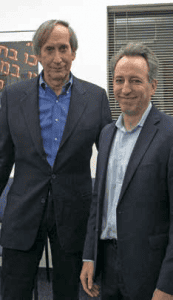 For Aaron David Miller, any opportunity to get out of Washington is appreciated, but on Monday, Feb. 12, the treat was for the Tidewater Jewish community. In a packed room, Miller, the vice president of New Initiatives at the Woodrow Wilson International Center for Scholars in Washington DC, shared his view on the role of the U.S.A. in the Middle East and the lessons he learned while navigating the negotiators highway. Miller is also an author, columnist, and frequent commentator on CNN, Fox News, MSNBC, and NPR, as well as a former analyst, negotiator, and advisor to the Middle East. He has served under both Republican and Democratic Secretaries of State.
For Aaron David Miller, any opportunity to get out of Washington is appreciated, but on Monday, Feb. 12, the treat was for the Tidewater Jewish community. In a packed room, Miller, the vice president of New Initiatives at the Woodrow Wilson International Center for Scholars in Washington DC, shared his view on the role of the U.S.A. in the Middle East and the lessons he learned while navigating the negotiators highway. Miller is also an author, columnist, and frequent commentator on CNN, Fox News, MSNBC, and NPR, as well as a former analyst, negotiator, and advisor to the Middle East. He has served under both Republican and Democratic Secretaries of State.
One of the strong points that he emphasized was the importance of understanding location. “Where you stand in life has everything to do with where you sit,” says Miller, who went on to explain that while the U.S.A. and Israel have many shared values and goals, the two have dramatically different interests when it comes to the Middle East because of living in different worlds. Miller recounted a conversation he had while working on negotiations with an Israeli diplomat who turned to him and said, “Don’t lecture me about security. You live in Chevy Chase, Maryland. I live on top of a volcano.”
The United States has unprecedented security, explained Miller. To the north and south of the country are non-predatory neighbors, and to the east and west are “liquid assets.” This impacts the nation’s foreign policy tremendously and, in many cases, can taint it with naivety, idealism, and arrogance.
The other important point Miller made was the significance of understanding history. “Any time we’ve failed in diplomacy, it was because we acted on the belief of what the world should be, and didn’t look at what it was,” says Miller, “It is a balance to appreciate where we stand and mesh that with what we want it to be. We need to be idealistic without illusion. It is okay to aspire, but it is important do it with eyes wide open to reality. The line between being dumb and being smart is defined by our understanding of history and our gauge of reality. Without this, foreign policy is almost guaranteed to fail. If forcing peace is ineffective, what does Miller suggest the U.S. foreign policy should be in the Middle East? To transact, not transform. This is how the only other peace deals with Egypt and Jordan have succeeded, and, according to Miller, it is the only way for the U.S. to succeed in the future.
The Community Relations Council of the United Jewish Federation of Tidewater and Simon Family JCC, along with community partners, present Israel Today @ 70. For more information and to RSVP for upcoming events, visit JewishVA.org/IsraelToday.
– Raizy Cook

